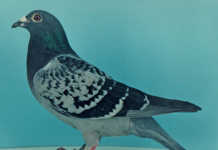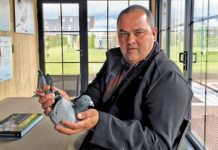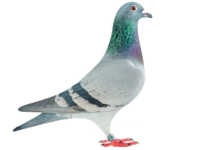Racing Pigeon Auctions are no different to other auctions where items of value are sold. In the past, when the slave trade was still legal, even people were auctioned.
The object of placing an item on auction is to get a better price for it. Competition bidding sees to it that the goods sell to the highest bidder. As a bonus, all the goods you place on auction are sold simultaneously. Clearing all items in a single blow helps if you’re in a hurry.
Types of auctions
A (complete) dispersal sale. This is the most common auction in pigeon racing. The fancier doesn’t hold back and sells every pigeon in his loft. A full dispersal auction of a successful pigeon fancier provides buyers with an opportunity to buy the very best from a champion loft.
If money is no problem, buy the “click” pairs and a few winning offspring. As a backup, buy a few young offspring from the best pairs in the case of the older proven stock going infertile, leaving you with nothing to show for your investment.
The greatest advantage of buying at a full dispersal sale is that you can continue with the same breeding system the champion seller used. The hard work of building a successful gene pool has been done for you.
Relocation auction. When an established pigeon fancier relocates, he can’t take all the pigeons from his race team and instead transfers them to the stock loft. If the decision to relocate came unexpectedly, the fancier may find that the newly weaned youngsters are too old to resettle at other premises.
Such fanciers may decide to keep only a few base pairs with a number of back-up youngsters for future use. All the remaining breeders, proven racers and newly bred youngsters, are then put up for auction. Proven pigeons are still available and one may find a “click” pair or two at such auctions.Cutting-down-the-numbers auction.
In this case the fancier needs to make space to accommodate his newly bred youngsters, but is stuck with a loft overfilled with proven racers bred from season to season. To fetch a fair price for mature breeders, they need to be sold before becoming infertile.
One may find that the overall quality of pigeons on display in this auction doesn’t match the bulk quality of a full dispersal sale, where nothing is held back. A closer study of the auction catalogue should be made to determine which available pigeons are bred the closest to the performance gene pool coming from the foundation stock. If direct offspring to the seller’s super breeders and super racers are not available, give the auction a miss.
All this fancier is doing is cutting down the numbers of the not-so-good pigeons at your expense.
Promotional auctions. These auctions are advertising or awareness campaigns held to promote the possibility of future transactions by getting a foot in the market. Mostly established fanciers or breeding stations offer youngsters of their very best pigeons.
Dishonesty at auctions
In certain pigeon clubs abroad, a fancier holding a (complete) dispersal auction is only permitted to restart with his hobby under certain conditions. This is to prevent dishonesty. It’s common knowledge that dishonest fanciers arrange fake buyers, usually close friends, to bid at their own auctions to get their prime stock back, while leaving serious buyers with the leftovers.
Among these leftovers may be a number of good birds, but this doesn’t change the fact that the real goodies were never on sale to begin with. To cover this fraud, the fancier hides the pigeons purchased by his friends, who then breed with them, receiving a youngster or two as a thanksgiving token for their “help”.
False pedigrees are also common at auctions. Pedigrees aren’t just pieces of paper, because a fancier buys within the specific gene pool that he owns. He may want to purchase fresh blood for an out-cross. If the pedigree information isn’t honest, it can ruin a good loft’s gene pool. Dishonesty about the performance of a pigeon, in an attempt to get a better price for it, is fraud.
Lastly, deceptive information is often given at auctions. It’s often joked that the number of winning positions listed on a fancier’s auction catalogue outstrips the amount of races listed on the season’s programme. The biggest disadvantage of selling your pigeons is that it’s not easy to restart on the same level of success once your champion stock is sold.











